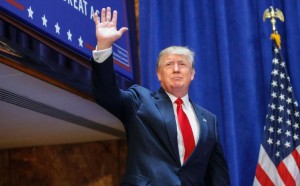Special to WorldTribune.com
Donald Trump correctly asserted that President Barack Obama’s weakness has emboldened China, but the GOP front-runner has also hinted he will continue 1980s-era business-oriented approaches toward Beijing that have not worked, national security journalist Bill Gertz wrote.
“Our president has allowed China to continue its economic assault on American jobs and wealth, refusing to enforce trade rules — or apply the leverage on China necessary to rein in North Korea,” Trump said in a recent foreign policy speech. “He has even allowed China to steal government secrets with cyberattacks and engage in industrial espionage against the United States and its companies.”

“We have great economic — and people don’t understand this — but we have tremendous economic power over China,” Trump said. “And that’s the power of trade. Because they use us as their bank, as their piggy bank, they take but they don’t have to pay us back.”
Writing for Asia Times on May 3, Gertz said Trump’s approach “is based on the questionable assumption that trading with a nuclear-armed communist dictatorship – even one that has all but abandoned its Marxist-Leninist economics but kept its Leninist political controls – eventually will produce a more benign and ‘normal’ China. The approach has not worked, however.
“Take two examples. Chinese President Xi Jinping, who has consolidated more power than any recent ruler since Mao, in September made two high profile agreements with the United States. Within months, China had violated both.
“The first was the Chinese leader’s promise not to militarize some of China’s 3,200 acres of newly created South China Sea islands. Within months of the pledge, the People’s Liberation Army began deploying anti-aircraft and anti-ship missiles and warplanes on Woody Island in the Paracels, claimed by both China and Vietnam.
“Xi also formally agreed at the September summit in Washington, under pressure from Obama over widespread Chinese hacking of large data sets, that China would halt cyber economic espionage. Earlier this year, U.S. intelligence leaders told Congress that Chinese cyber spying continued unabated.”
The solution to the threats posed by China, “whether in the South China Sea and against American government and private sector computer networks that have been pillaged for decades by Chinese hackers, is not as simple as conducting tougher negotiations, as Trump advocates,” Gertz wrote.
“The failed record of unfettered engagement with China on trade and economic issues has not solved the problems posed by increasing Chinese hegemony and threatening activities.
“A more comprehensive strategy of countering Asia’s emerging superpower is needed. That strategy must be centered on American interests, as Trump correctly notes. But it also needs to understand the root cause of the threat as China’s unsustainable reformist-style communist system, combined with the growing trend of hardline People’s Liberation Army military leaders who appear increasingly eager to test out some of China’s rapidly expanding high-technology forces in a crisis, and thus trigger a conflict.”

You must be logged in to post a comment Login